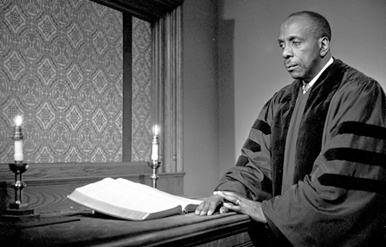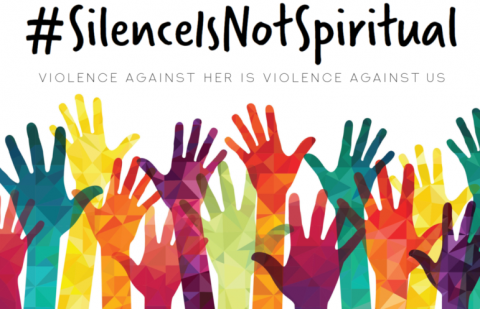an intervention for our disquieted world A story is told from the early centuries of Christian monasticism in the Egyptian desert. Some men came to counsel with Abba Poemen, asking him, “Tell us, when we see brothers dozing during the Sacred Office, should we pinch them so they will stay awake?” The Abba said to them, “Actually, if I saw a brother sleeping, I would put his head on my knees and let him rest.” This is an act of kindness.
The English word “kind” comes from the same etymological root as “kin.” We are to live kindly with one another because we belong to one another. We are humankind. Living kindly goes without saying for those whom we cherish, identify with, and to whom we feel a sense of belonging. It is easy (or at least easier) to be kind to someone we love. The New Testament word for kindness is defined as compassion, love, full of tenderness, gentleness, goodness.
However if we read the scriptures forensically, we see how kindness redresses how we could otherwise deport ourselves in the presence of those who are different – because of their culture or race, religion, class, education, sexual orientation, or age – or different because of their hopes or values. In the Hebrew scriptures, we read one time, “You shall love your neighbor as yourself”; however we read in thirty-six places to “love the stranger.”
[1] Jesus magnifies this teaching in his own behavior. He doesn’t exclude anyone, even those who were viewed by most people as despicable. The prevailing reason why Jesus said what he said and did what he did was tender loving mercy, which is compassion: suffering with another because we belong to one another. Whether to the lame or lost, to the pompous or to paupers, Jesus was compassionate.
[2] Most people, most of the time, are doing the best they can… which is sometimes quite tragic, even deplorable. “The Lord is full of compassion and mercy, slow to anger and of great kindness.”
[3] Jesus’ kindness is remembered in the Greek as philonexia, which is “the love of strangers.” Philonexia is the opposite of xenophobia, which is the fear or hatred of strangers, the discrimination against strangers. Philonexia, the love of strangers, becomes the New Testament norm for sharing life, living kindly with one another. “Let mutual love continue. Do not neglect to show hospitality to strangers, for by doing that some have entertained angels without knowing it.”
[4] Philonexia, not xenophobia. Kindness breaks down “the wall of hostility” that otherwise easily is constructed between ourselves and “others.”
[5] Kindness arises from compassion, the memory that we are all kin.
Kindness also conveys dignity, by bequeathing worth to others. So many people live their lives with deafening words of criticism, inadequacy, and fear which may echo from their childhoods. They will collude with this indignity unless there is an intervention, an intervention of kindness from someone else. For many people, we must give them dignity before there is dignity in them to respect.
In this, kindness is an act of generosity. Generosity presumes life to be a gift, not a given. We participate in life on God’s terms by cherishing the gifts of life, not clinging to them, not hoarding, but sharing from God’s bounty entrusted to us. There is always more. When we are generous with our kindness, this generosity enables others to know life as a gift, and invites them to live life thankfully. Gratitude transforms life; generosity enables it. “As God’s chosen ones, holy and beloved, clothe yourselves with compassion, kindness, humility, meekness, and patience.”
[6] Kindness is described as one of the “fruits of the Spirit.”
[7] Here are some practices to cultivate the fruit of kindness in your life.
Draw on your miracle memory. Reflect on where you were on the receiving end of kindness. Who was kind to you, and why did that make such a difference? Embrace the kindness. It’s never too late to be thankful for another’s intervention of kindness in your life.
Be compassionate toward yourself. You are an amazing person; you are also a mixed bag and, some days, a mess. An early desert monastic, Abba Mateos, said, “the nearer we draw to God, the more we see ourselves as sinners.” Don’t let this awareness imprison you; let it liberate you, because God knows you and loves you. You need to be saved from yourself every day. Surrender feigning to be your own god. Jesus is your savior, your friend. Befriend yourself. Practicing this will make a world of difference to you and to others. “Be kind to one another, tenderhearted, forgiving one another, just as God in Christ forgave you.
[8]
Don’t restrict. Deport yourself with kindness in the face of every living creature, toward the flowers and crops, and trees, to the air and water. We are living in a time where so many of our values and certainties are being deconstructed. We know too much, and we know too little. How then shall we live? Live kindly. St. Isaac of Syria (7th century), said “Let your heart burn with love for the whole of creation: for humankind, for the birds, for the beasts, for every creature.”
Don’t wait. We only have now. Don’t wait to reciprocate kindness. Initiate kindness. If you are living kindly, you won’t be “on the take” for kindness, expecting it, demanding it, resenting when it doesn’t appear. Oftentimes it doesn’t. Living kindly generates kindness. You simply cannot give it away. There is always more. Live kindly, and you will have enough kindness in your heart so as not to be endlessly shopping for others’ kindness. If you are out of practice with kindness, cultivating kindness is like any other practice, e.g., learning a sport, or foreign language, or craft, or playing a musical instrument. The words “kind” and “kindle” are cousins. Kindle kindness and you will teem with kindness.
A brother asked Abba Pimenion, “How should we practice life?” And the old man said, “To live ever in loving kindness and in humbleness, and to do good to one’s neighbor.” Kindness is of our God-created essence, a necessary intervention for our disquieted world.
What does the Lord require of you
but to do justice,
and to love kindness,
and to walk humbly with your God.
(Micah 6:8)
A PRAYER FOR KINDNESS
Kindle kindness in me, O Lord. Let my heart burn with love for the whole of creation, for others, for myself, and for you.
Br. Curtis Almquist, SSJE
[1] See, e.g., Exodus 22:21, 23:9; Leviticus 19:33-34.
[2] See, e.g., Matthew 6:25-34, 9:36, 14:14, 20:34; Mark 1:41, 4:40, 5:36, 6:34, 8:2f, 12:41-44; Luke 7:13, 10:41.
[3] Psalm 103:8.
[4] Hebrews 13:1-2.
[5] Ephesians 2:14.
[6] Colossians 3:12.
[7] Galatians 5:22.
[8] Ephesians 4:32.

Jesus laid out the fundamentals for any who would follow him when he said, “The first [commandment] of all is, ‘Hear, O Israel: the Lord our God, the Lord is one; you shall love the Lord your God with all your heart, and with all your soul, and with all your mind, and with all your strength.’ The second is this, ‘You shall love your neighbor as yourself’” (Mark 12:29-31).
 In other words, Beloved Community is the practical image of the world we pray for when we say, “Thy kingdom come, thy will be done, on earth as it is in heaven.” We dream of communities where all people may experience dignity and abundant life, and see themselves and others as beloved children of God. We pray for communities that labor so that the flourishing of every person (and all creation) is seen as the hope of each. Conceived this way, Beloved Community provides a deeply faithful paradigm for transformation, formation, organizing, advocacy, and witness.
In other words, Beloved Community is the practical image of the world we pray for when we say, “Thy kingdom come, thy will be done, on earth as it is in heaven.” We dream of communities where all people may experience dignity and abundant life, and see themselves and others as beloved children of God. We pray for communities that labor so that the flourishing of every person (and all creation) is seen as the hope of each. Conceived this way, Beloved Community provides a deeply faithful paradigm for transformation, formation, organizing, advocacy, and witness. 
.png)









